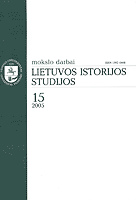NEFORMALŪS KORUPCINIAI SANTYKIAI ŠIANDIENĖJE LIETUVOJE: SAMPRATOS IR PRAKTIKOS (BANDYMAI ANALIZUOTI BLATO RAIDĄ)
INFORMAL NETWORKS OF CORRUPTION IN CONTEMPORARY LITHUANIA: BETWEEN PRACTICE AND INTERPRETATION (AN ATTEMPT TO STUDY EVOLUTION OF BLAT)
Author(s): Donatas BrandišauskasSubject(s): History
Published by: Vilniaus Universiteto Leidykla
Summary/Abstract: Over the past decade, the corruption has become a popular concern, the subject of considerable investigation, and the target of international efforts in Lithuania. In a period of communism rule blat as one form of corruption plays a major role in explaining the everyday economic practices of Soviet society. Blat is person or use of informal network (reciprocity) based on trust and established relations using friends, acquaintance or relatives to obtain goods and values. In Soviet times, blat existed in shortage condition, and was alternate for central distribution of state recourses that became the legitimate feature of behavior and mentality. The main task of my article is investigation of informal relations in the contemporary Lithuania. At least two different hypothesis might be relevant to consider: one, which claims that such phenomenon as blat no longer exist, and another stating that the practices of using informal networks still exist, albeit in different forms. My focus in this paper was if and how Lithuanians of today use their informal networks (blat) and personal relations to obtain goods or values from people in formal positions in everyday life. I argue that despite some changes, informal relations play a crucial role in many contemporary social transactions in Lithuania and create the environment where corruption can successfully flourish.
Journal: Lietuvos istorijos studijos
- Issue Year: 2005
- Issue No: 15
- Page Range: 70-80
- Page Count: 11
- Language: Lithuanian

